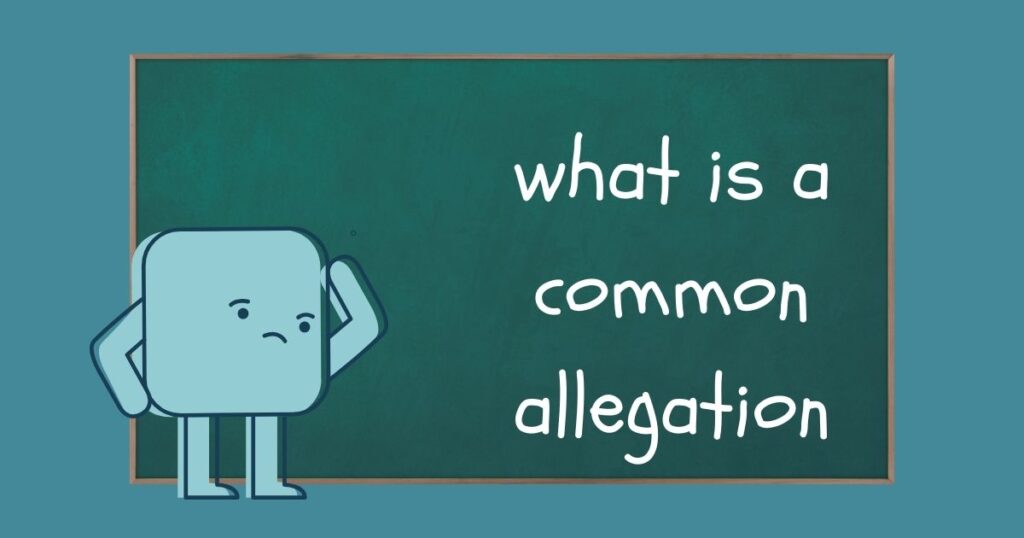Allegations are a fundamental aspect of legal systems, interpersonal relationships, and organizational structures. Understanding what constitutes a common allegation and its potential impact is essential for navigating the complexities of both personal and professional life. This article explores common allegations, their origins, and their implications in various contexts.
What Are Allegations?
Allegations are claims or accusations made without immediate proof. They can range from casual assertions to serious legal accusations. These claims are often the starting point for investigations or disputes, requiring validation through evidence or inquiry.
Common Types of Allegations
Allegations can arise in various contexts, and understanding their categories helps clarify their significance.
Workplace Allegations
In professional settings, allegations frequently involve issues such as harassment, discrimination, or misconduct. These accusations can severely impact an individual’s career and a company’s reputation, often necessitating swift and impartial investigations.
Legal Allegations
In the legal realm, allegations can pertain to criminal activities, breaches of contract, or civil disputes. These claims are usually addressed in court, where evidence and testimony determine their validity.
Interpersonal Allegations
Allegations in personal relationships may include accusations of infidelity, abuse, or dishonesty. These claims can strain or break relationships and often require open communication or mediation to resolve.
How Do Allegations Arise?
Understanding the origins of allegations can provide insight into their dynamics and potential consequences.
Misunderstandings
Many allegations stem from simple misunderstandings or misinterpretations of actions or words. Clear communication is often key to resolving these situations.
Malicious Intent
Some allegations are made with malicious intent, aiming to harm an individual’s reputation or well-being. Such false claims can lead to defamation lawsuits or counter-allegations.
Legitimate Concerns
Genuine concerns often lead to allegations, particularly when individuals feel wronged or victimized. Addressing these concerns seriously and objectively is crucial to maintaining trust.
The Impact of Allegations
Allegations can have far-reaching effects on individuals, organizations, and society at large.
Reputation Damage
Even unproven allegations can tarnish reputations. Public accusations, especially in the digital age, can lead to long-term social and professional consequences.
Emotional and Psychological Toll
Being accused or making allegations can take a significant emotional toll. Feelings of stress, anxiety, and vulnerability are common among those involved.
Legal Consequences
Depending on the nature of the allegation, legal repercussions may follow. This could include fines, penalties, or imprisonment for proven claims.
Steps to Handle Allegations
Properly addressing allegations requires a structured and fair approach.
Investigate Thoroughly
Conducting a detailed investigation is critical. Collecting evidence, interviewing witnesses, and maintaining neutrality can help uncover the truth.
Maintain Confidentiality
Handling allegations discreetly protects the privacy and dignity of all parties involved. It also helps prevent premature judgments.
Seek Legal Advice
In serious cases, consulting legal experts ensures that the matter is handled in compliance with laws and regulations.
Support for Those Involved
Providing emotional and professional support to those making or facing allegations is vital. This can include counseling or access to legal resources.
Preventing Allegations
While not all allegations can be avoided, proactive measures can reduce their likelihood.
Foster Open Communication
Encouraging honest and transparent communication in workplaces and relationships helps prevent misunderstandings that may lead to allegations.
Implement Clear Policies
Establishing and enforcing clear guidelines, particularly in professional settings, helps create an environment where grievances can be addressed constructively.
Educate and Train
Providing education on appropriate behavior, conflict resolution, and ethical practices reduces the chances of allegations arising from ignorance or misconduct.
Conclusion
Allegations are an inevitable part of human interactions, but their impact can be minimized with understanding, communication, and proactive measures. Whether in legal, workplace, or personal contexts, addressing claims fairly and transparently is essential to maintaining trust and integrity.
FAQs
What is the difference between an allegation and a proven claim?
An allegation is a claim made without evidence, while a proven claim is substantiated with verified facts.
How should I respond to a false allegation?
Respond calmly, gather evidence to refute the claim, and consider seeking legal advice if necessary.
Can allegations be retracted?
Yes, an accuser can retract an allegation, but the impact of the initial claim may still linger.
Are allegations always public?
Not necessarily. Allegations can be handled privately unless they involve legal proceedings or public interest.
How can organizations prevent workplace allegations?
Organizations can prevent allegations by fostering a positive work culture, implementing clear policies, and providing regular training.







